We celebrate the UK innovators further empowering people with disabilities through assistive technology.
According to WHO’s World Report on Disability, around 15 per cent of the entire world’s population is disabled, which amounts to over a billion people. It’s safe to say that it’s no niche market as investment into disability tech is set to grow as the world thankfully becomes more inclusive. Furthermore, disabled users are massive advocates for tech, so it’s a market with a really invested audience.
Advances
Advances in assistive technology have the potential to improve not just the lives of people with disabilities, but everyone. It’s easy to forget that ultimately there is disability, such as hearing loss, sight loss and loss of dexterity in the ageing process. Thankfully, in the technology accelerated world we live in today the opportunity for innovation is possible and progress is being made at a remarkable pace.
Opportunities
2021 has already witnessed a milestone for disabled people, at a briefing held this month the European Space Agency (ESA) declared they are seeking new astronauts for the first time in a decade, aiming to recruit one person with a disability. The agency said it was keen to improve its record on diversity and inclusion and wants one of the new recruits to have a disability – a “parastronaut”. Director of ESA’s human spaceflight programme Dr David Parker said:
“To be absolutely clear, we’re not looking to hire a space tourist that happens also to have a disability … this individual would do a meaningful space mission. So, they would need to do the science; they would need to participate in all the normal operations of the International Space Station.”
This just shows the important role technology can play in opening up opportunities that disabled people may have never dared to dream about. Obviously, this is rather an extraordinary example but in a new era of smart, innovative workplaces the gap between employees belonging to the wider population and those with some kind of impairments can be significantly narrowed.
??
We may only be a small island in the grand scale of things, but UK innovators are making strides in the disability technology world that are worth celebrating:
BioLiberty’s AI Robotic Glove
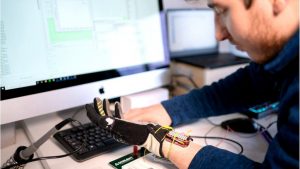
Image Source: BioLibery
A robotic glove based on AI technology could soon help people recover muscle grip in their hands. This impressive innovation amplifies grip and offers a digital therapy platform for hand rehabilitation. The glove is aimed at the 2.5 million people living in the UK who suffer from hand weakness because of muscle mass loss as they age or due to illnesses like multiple sclerosis, Motor Neurone Disease and carpal tunnel syndrome. Using Electromyography (EMG), UK start-up BioLiberty measure electrical activity in response to a nerve’s stimulation of the muscle, detecting a user’s intention to grip. An algorithm is then used to convert the intention into force, helping the user to hold an item or apply the necessary pressure to complete an activity. Very clever! Co-founder Ross O’Hanlon, 24, was motivated to start the company when his aunt was diagnosed with multiple sclerosis and began to lose movement.
Find out more about BioLiberty and their solution here: https://www.bioliberty.co.uk
Team Brit’s Racing Hand Controls
Team BRIT is a competitive motor racing team consisting of disabled drivers. Alongside this they have developed racing hand controls that are widely recognized as the most advanced in the world. Their hand controls can be used on the track and for simulation racing – allowing even more disabled people to take up motorsport. With the pedals functioning as normal, their system is highly flexible so it can suit drivers with a wide range of disabilities. According to their website Team Brit’s hand controls have been inspected by David Lapworth, one of the world’s most respected racing engineers, Chairman of the Technical Committee for Motor Sport UK and Technical Director for ProDrive/Aston Martin Racing.
One of their aims is to make racing history and take a team to the world famous Le Mans 24hr endurance race, becoming the first ever British all-disabled team to do so.
Find out more about Team Brit here – https://www.teambrit.co.uk
Centaur Robotics COVID-safe electric wheelchair
A pioneering electric wheelchair from Centaur Robotics, designed to enable social distancing and built with COVID-resistant materials, has recently been awarded a UK government grant of £175,000.
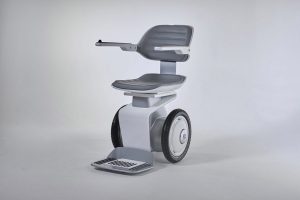
Image source: Centaur Robotics
This fantastic innovation made and engineered in the United Kingdom hopes to redefine mobility using self-balancing technology, designed with height adjustability and access in mind and made from easy to clean materials. The vision is to reduce unnecessary contact and the likelihood of infection, whilst increasing socialisation. Batteries will be made from recycled materials as part of Centaur Robotics’ sustainability goals.
Find out more about Centaur Robotics here – https://centaurrobotics.com
Sentai – The smart device for independent living
Recognised as the best of British Innovation in 2020 by Innovate UK, the UK’s innovation agency, this is playing its part in championing companionship. Although technically not aimed at the disabled market, it’s uses extend far beyond the elderly & care sector so it’s definitely worthy of a mention.
Described as a proactive personal in-room buddy, this smart device is powered by the latest advances in Artificial Intelligence, supporting better living and smarter care. Thanks to its unique Augmented Voice Technology® Sentai is a voice users can rely on. According to their website as well as responding to its user, Sentai proactively starts conversations appropriate to the time of day and situation, and speaks in different personalities and tones, building a relationship with the user. Sentai constantly uses the responses and actions to help it learn and adapt, providing the best possible personalised experience.
Find out more about Sentai and their product here – https://www.sentai.ai
Smile Smart Technology’s Drivedeck
The Drivedeck is a semi-autonomous driving solution for mobility assessment and access teaching with the safety of line following and anti-collision sensors, offering users the chance to explore their environment in safety at their own pace. It features motion control, line following, voice confirmation, anti-collision sensors, speed control and carer control.
Smile Smart Technology innovate and manufacture from their UK workshops and reinvest the majority of their profits towards sustaining and improving their social mission of supporting children and adults with disabilities.
Find out more about Smile Smart Technology and the Drivedeck here – https://www.smilesmart-tech.com
There’s no denying it, technology for the disabled and assistive technology has taken major strides over the last few years but there’s still room for growth. It’s important that tech companies build a more diverse framework at the beginning of the design process, ensuring accessibility is woven in right from the start and not considered as an afterthought. Products must be made inclusive now as it’s in everyone’s best interests to design with people with disabilities in mind.
UK Electronics are approved to assemble medical devices
Are you looking for an electronics manufacturer that holds an ISO 13485:2016 – Medical Devices accreditation? UK Electronics received their accreditation in March 2019 so we can confidently offer medical device product development, manufacture, and PCB assembly whilst incorporating medical device safety standards.
Our dedicated workforce, solid foundations and high stocks of components means we are well positioned to assemble medical devices.
If you require any aspects of our manufacturing or R&D services, then please speak with a member of our sales team: sales@ukelectronics.co.uk

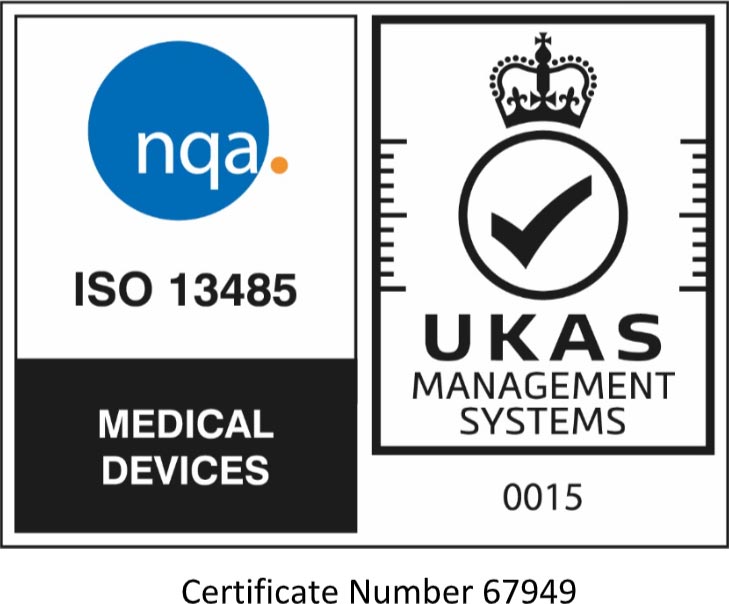
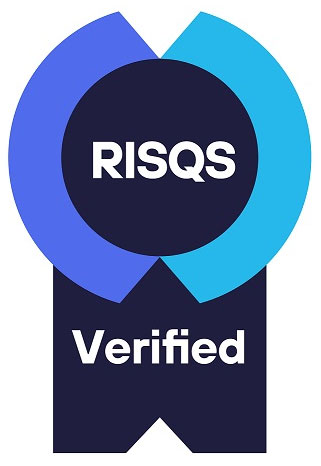




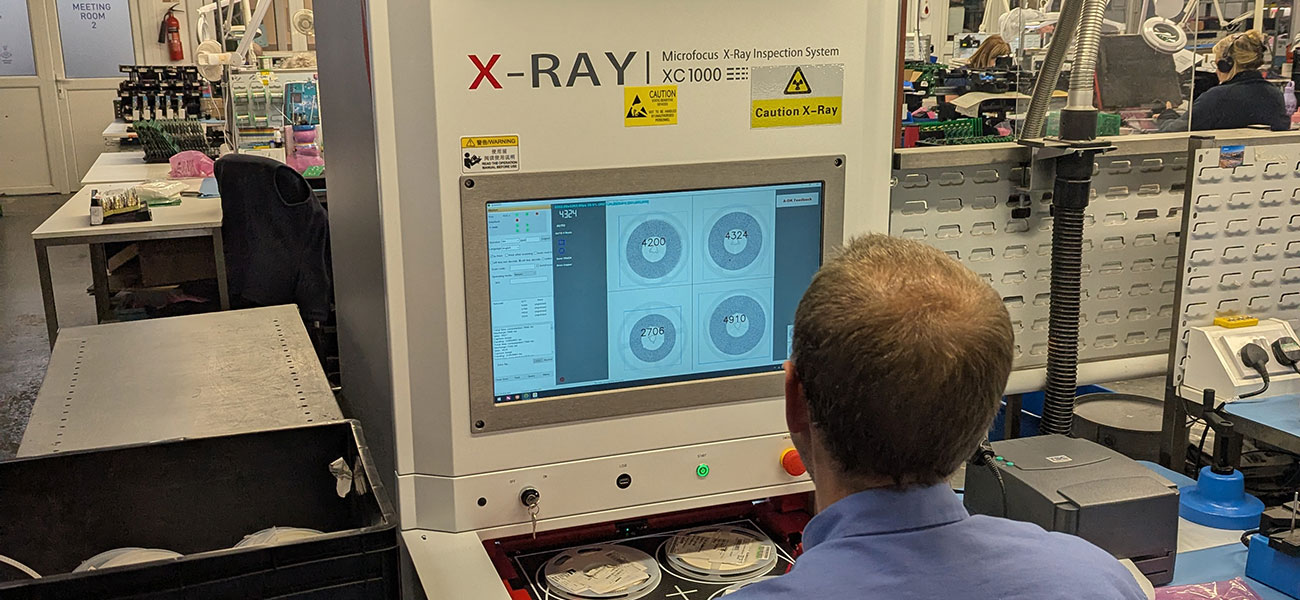
 PCB Design
PCB Design  Electronic Assembly
Electronic Assembly  PCB Prototyping
PCB Prototyping  EMC Testing
EMC Testing  Box Build
Box Build  Cable Assembly
Cable Assembly